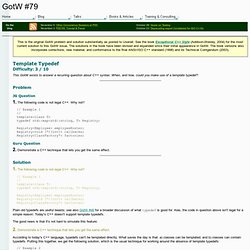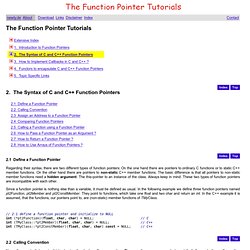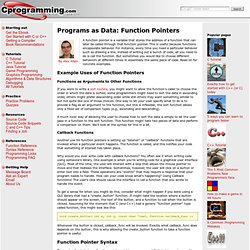

79: Template Typedef. This GotW exists to answer a recurring question about C++ syntax: When, and how, could you make use of a template typedef?

Problem JG Question 1. The following code is not legal C++. Why not? // Example 1 // template<class T> typedef std::map<std::string, T> Registry; Registry<Employee> employeeRoster; Registry<void (*)(int)> callbacks; Registry<ClassFactory*> factories; Guru Question 2. Solution Plain old typedefs are useful beasts; see also GotW #46 for a broader discussion of what typedef is good for. The good news is that it's not hard to simulate this feature: According to today's C++ language, typedefs can't be templated directly. This solution isn't quite the same as having a template typedef, but it's close.
Registry<Employee>::Type employeeRoster; Registry<void (*)(int)>::Type callbacks; Registry<ClassFactory*>::Type factories; It's Deja Vu All Over Again As noted above, Example 2 is "the usual workaround. " // Example 3 // // The type of af is SomeAllocator<float> SomeAllocator<float> af; The Function Pointer Tutorials - Syntax. 2.1 Define a Function Pointer Regarding their syntax, there are two different types of function pointers: On the one hand there are pointers to ordinary C functions or to static C++ member functions.

On the other hand there are pointers to non-static C++ member functions. The basic difference is that all pointers to non-static member functions need a hidden argument: The this-pointer to an instance of the class. Always keep in mind: These two types of function pointers are incompatible with each other. Since a function pointer is nothing else than a variable, it must be defined as usual. // 2.1 define a function pointer and initialize to NULLint (*pt2Function)(float, char, char) = NULL; // Cint (TMyClass::*pt2Member)(float, char, char) = NULL; // C++int (TMyClass::*pt2ConstMember)(float, char, char) const = NULL; // C++ Normally you don't have to think about a function's calling convention: The compiler assumes __cdecl as default if you don't specify another convention.
C++ - Typedef function pointer. Function Pointers in C and C. A function pointer is a variable that stores the address of a function that can later be called through that function pointer.

This is useful because functions encapsulate behavior. For instance, every time you need a particular behavior such as drawing a line, instead of writing out a bunch of code, all you need to do is call the function. But sometimes you would like to choose different behaviors at different times in essentially the same piece of code. Read on for concrete examples. Example Uses of Function Pointers Functions as Arguments to Other Functions If you were to write a sort routine, you might want to allow the function's caller to choose the order in which the data is sorted; some programmers might need to sort the data in ascending order, others might prefer descending order while still others may want something similar to but not quite like one of those choices.
Callback Functions Why would you ever write code with callback functions? Function Pointer Syntax Syntax Declaring.